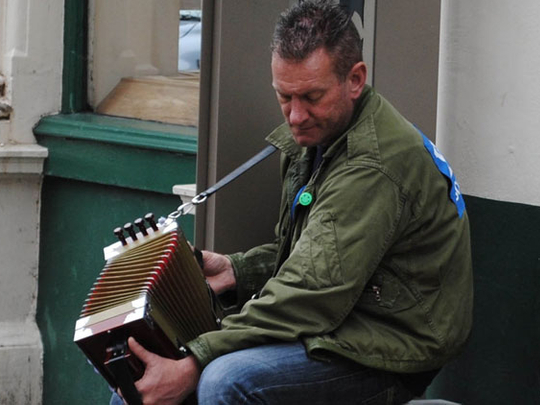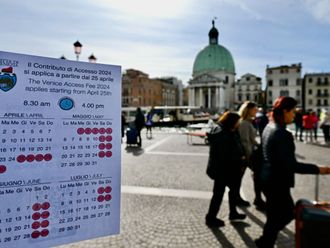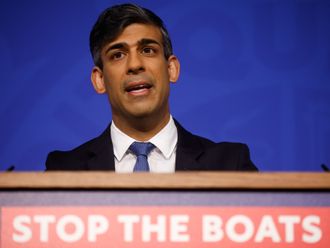
Edinburgh: Down an alley and out of the autumn wind blowing over Princess Street, a busker was banging on an accordion doing his best on a bad rendition of Flower of Scotland.
That’s a tune that has been proposed by Scots as their new national anthem — if they vote for independence on Thursday.
At rugby games, hoards of hairy Scots band together to belt it, singing with gusto on the glory of Robert the Bruce’s crushing victory over Edward II of England’s forces at Bannockburn 700 years ago. Given the way the busker was belting it, a good hit with a medieval battle hammer was in order. It was enough to make the deafest of passersby cringe.
And here in Scotland’s capital, there is a lot of cringing going on. According to polls, a majority of the 450,000 residents who live here are in the ‘no’ camp.
If true, it’s a strange dichotomy — a city with all of the trappings of capital, but unwilling to take on the full mantle of capital.
Above Princess Street and across the neat park where the old trees were taking on the first blushes of autumn, Edinburgh Castle stands sentinel. Down the Royal Mile, Castlehill and Lawnmarket, tourists from around the world milled about, snapping selfies — hysterical faces in historical places. The tills in the tartan sellers and souvenirs shops were ringing over nicely, selling Scotland T-shirts, flags, mugs, key chains and sweats, while real Scots in the capital were sweating over Thursday’s outcome.
Just off the Royal Mile, the new Scottish parliament building sits, an angular and peculiar marvel of modern architecture.
While the city’s old buildings are dressed with gargoyles and cherubs, here the words of Scotland’s poets, songwriters and artists are carved in relief on the parliament’s facade. In the street outside, as Edinburghers go about their business, there’s little relief from knowing that Thursday’s vote will either maintain the solid and conservative nature of the city as an essential tourist destination when “doing Scotland”, or it will actually be a capital city of standing. Embassies, ambassadors, heads of state, international and national responsibilities.
“I hope that when I wake up on Friday morning I see that Scots haven’t made the biggest mistake of their life,” Danny Wright tells Gulf News. He’s handing out ‘yes’ campaign material, but most of those passing are tourists. “They stop and take it and most say that they think Scotland should be independent. It’s just a pity that people living here don’t see it that way.”
Retreating from the Princess Street wind, Malcolm Childs finds refuge in a coffee shop.
“Dubai?” he says. “I didn’t think our little referendum would attract that sort of attention.”
But it has, and how is the retired sales manager going to mark his ballot paper?
“I honestly haven’t decided,” he tells Gulf News. “I have listened to both sides of the debate. My son is in the Royal Air Force. Would he have to join the Scottish Air Force? There are so many unanswered questions. I was going to vote ‘no’ but I think London has misplayed the entire debate and just assumed that Scots would sleepwalk to a ‘no’. I also feel that I am making a decision that will affect generations to come. It is much easier to vote for something than against it.”
Childs places a napkin under his coffee to soak up the spill from the uneven table.
“The ‘no’ side has been terribly disorganised but I’m not convinced of what they’re saying. I do rather fear a backlash if there is a ‘no’ vote. I just don’t trust [UK Prime Minister David] Cameron,” he says. “But I also don’t trust Alex Salmond either. It also disappoints me that all of the offers of more powers for Scotland came once ‘yes’ appeared to be winning. Half a million voters had already voted at that stage. And there wasn’t a mention of devolution or Scotland in the Queen’s Speech in the spring.”
On a nearby square, a city parking warden is examining permits, looking for offending drivers, scanning tickets into his electronic device. Parking is at a premium.
If the embassies and ambassadors, heads of state, international and national responsibilities come, parking will even be more precious. Think of the power in his hands then and that little electronic device.
And isn’t that just it about Edinburgh right now. It has all of the prestige — it doesn’t have any real power.












